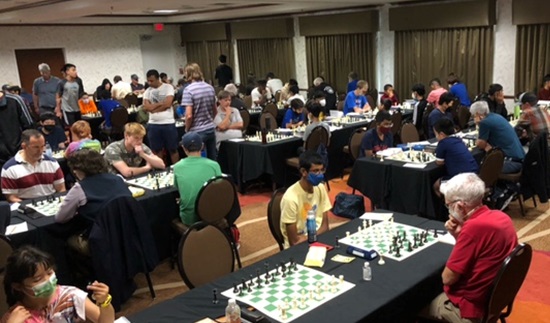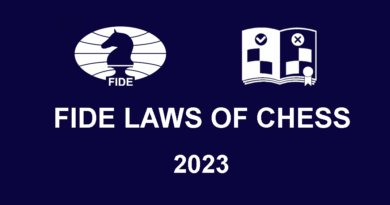Dealing with Unruly Parents and Coaches (part 1)
(text by: IA Mike Hoffpauir, Rules Commission Senior Adviser)
This article is a part of a series, the next ones will be published monthly.
I doubt there is an Arbiter among the readers who has not been confronted by one or more very upset parents or coaches during a chess tournament. These situations are often filled with emotion, making them quite difficult to address, particularly when the integrity of the Arbiter is (or the Arbiter team are) being personally attacked by the complainants. In this article I will explore three common situations and suggest ways to deal with them based on my own practical experience. The remedies I describe are not the only way to resolve each issue, as I am confident that some of you will have alternative approaches. I also contend that the method I use applies to other situations. So, let’s jump into the deep end of the pool and see what happens!
Scenario One: The Disruptive Opponent. This is a common scenario we face as Arbiters. In this situation, the complaint occurs after the game, when the parent/coach learns that their player lost. The complaint is, “My opponent kept bothering me and caused me to lose concentration.” As we all know, what actions constitute the alleged disruptive behavior have an almost endless set of possibilities such as, My opponent was: talking to me or to the players on the adjacent board; staring at me; making faces at me; not moving in a timely manner; moving the pieces with one hand and pressing the clock with the other hand; making a lot of illegal moves, telling me ‘you have to move here’ whenever I was in check; laughing at me and saying that I do not know how to play chess; kicking me under the table; constantly tapping their pencil on the table, etc. I can go on …
Of course, when the parent or coach approaches me, their position usually is that their player can do no wrong. Their opening statement might be, “This is our second tournament. We never imagined someone would do this in a chess tournament.” The first thing I do is to portray a friendly, attentive behavior. If my face or body language expresses that ‘this discussion is a waste of my time’, then you can be sure the complainants will detect these signals, and it will weaken the complainant’s confidence in my ability to resolve their situation. Accordingly, my approach is to begin with a personal introduction to the parent/coach and the player, asking the player for their name, where they are from, etc. For example, “My name is Mike Hoffpauir and I am the Chief Arbiter for this tournament. I am glad to meet you. How can I help?” My experience is that this technique lowers the tension and conveys that my position gives me the authority to hear their case and make a just ruling.
Next, I LISTEN intently to the complainant and the player. I might make a note or two. No matter how strange their story may sound I know I must keep a straight face. I nod my head when necessary and I ask clarifying questions. These actions help the complainant feel more at ease because they see that I am talking through their issue. I take great care to not give any signals with my facial expression or body language that might suggest I believe that their story could be among the most bizarre I have heard in my 20+ years as an Arbiter.
After they tell me their story, I rephrase it back to them and ask, “Do you believe I understand your complaint?” They will either say, “Yes,” or may add a few finer details. Either way, my goal is to get the complainants, especially the young player, to acknowledge that I understand their concern before I begin steps to resolve it.
After I am confident the complainants feel I understand the problem, the next question I frequently ask is directly to the player: “Did you ask for an Arbiter’s assistance with this problem during the game?” My approach now differs depending on whether the player says No or Yes.
First, if the player’s reply is, “No,” I often explain to the parent/coach that this issue is exactly the kind of problem Arbiters can best deal with during the game, while both players are present. Now that the game has ended, the Arbiter is unable to stop the disruptive behavior that they say affected their player. In response I have heard complainants say, “Our player is taught not to complain at the board,” or “Our player was too scared of the opponent to say something.” As Arbiters we also know there are certain ‘cultural norms’ that may hinder a young player’s desire to complain at the board. For example, some children are taught from a young age not to complain to a stranger or adults other than their parents, close relative, guardian, schoolteacher, or coach. At the chess tournament, the Arbiter is both a stranger and an adult. So, as you can appreciate, getting these parents/coaches to understand that every player has the right to complain about their opponent’s behavior during the game can sometimes be difficult. I usually explain that the Laws of Chess are written specifically to address problems like the one their player has raised, but that these difficulties really need to be handled at the board, when they occur … not in the postmortem.
Second, If their reply is, “Yes”, indicating that the player did complain to an Arbiter during the game, I may tell the parent/coach that I will need to talk with that Arbiter before I can make a final decision. If I am fortunate enough to already know which Arbiter was overseeing their player’s board, I will probably contact that Arbiter to discuss the situation. I might have he Arbiter present while I talk with the parents. However, if you do ask the ruling Arbiter to be present, I advise you to be cautious about two things:
- If you do bring the ruling Arbiter into the discussion the Arbiter must refrain from unusual facial expressions or body language. In fact, I have found it a better practice to have a separate discussion with that Arbiter.
- Also, the version of the story presented by the complainants often differs in substantive ways from the Arbiter’s recollection of the issue. For example, the ruling Arbiter’s version may be: “Your player only made one complaint during the game, and it was about the opponent talking to the player on the adjacent board. I corrected that player’s behavior and gave a warning about talking. Your player made no other complaints to me. In my Arbiter’s Notebook I recorded that the complaint occurred at 1447, which was about one quarter of the way through Round 2. If the problem persisted, it was not brought to my attention by the player.”
As I bring Scenario One to closure and issue my ruling, I want to be sure that the parent/coach and player understand that these matters need to be resolved at the board and that the player should not feel restrained or inhibited from asking for an Arbiter’s help while the game is in progress.


